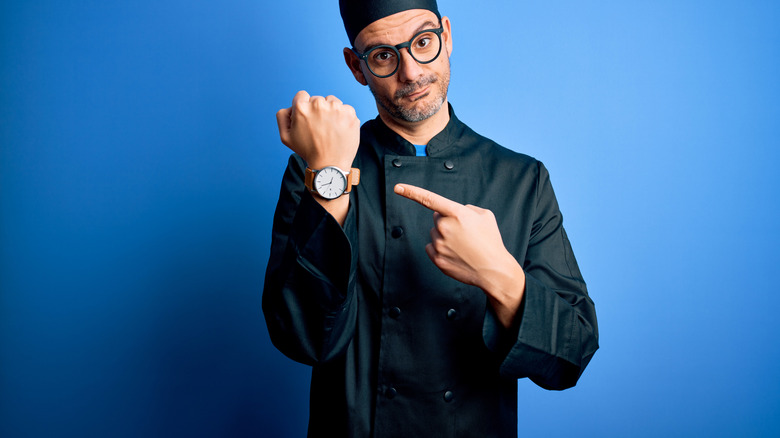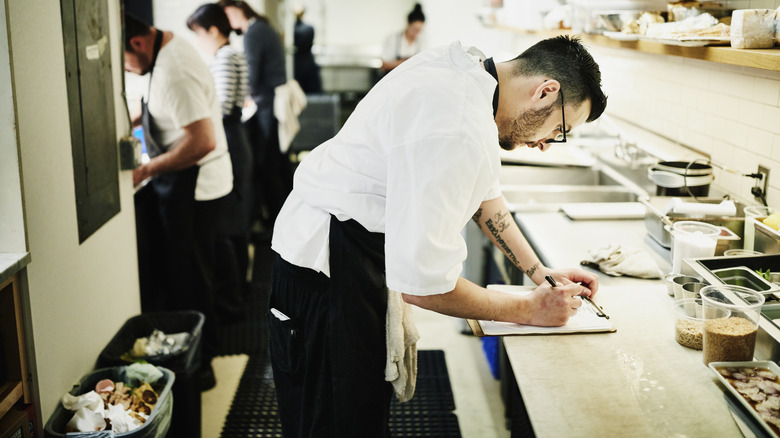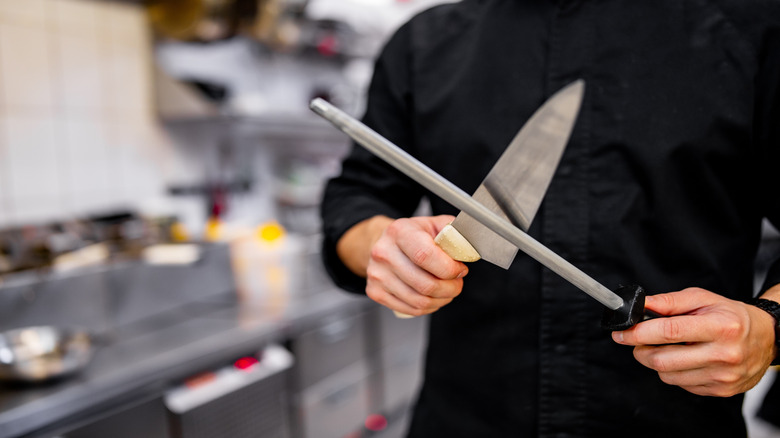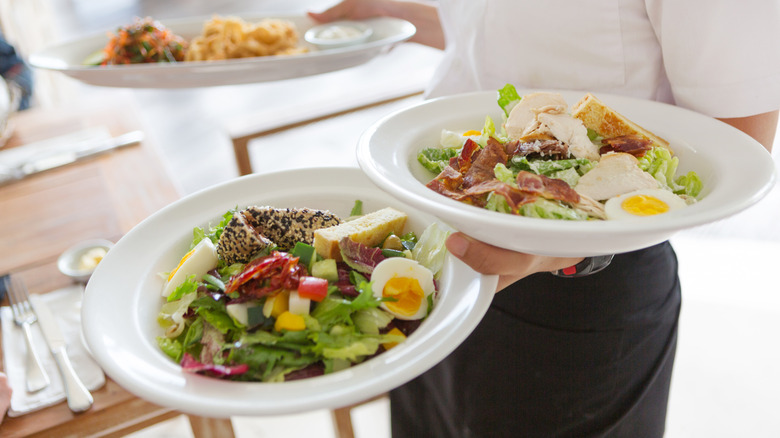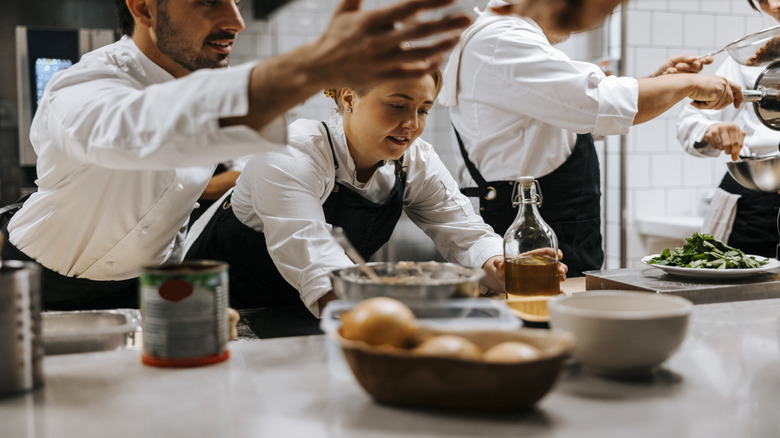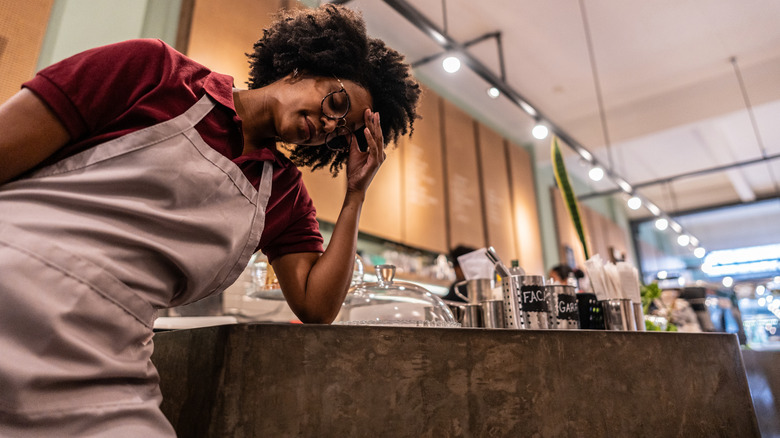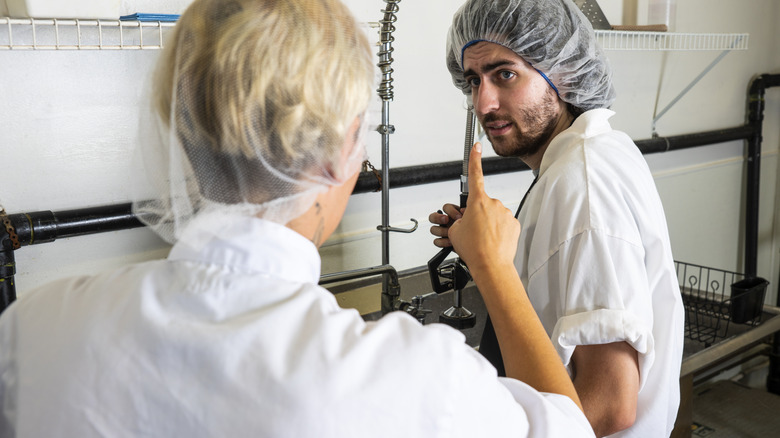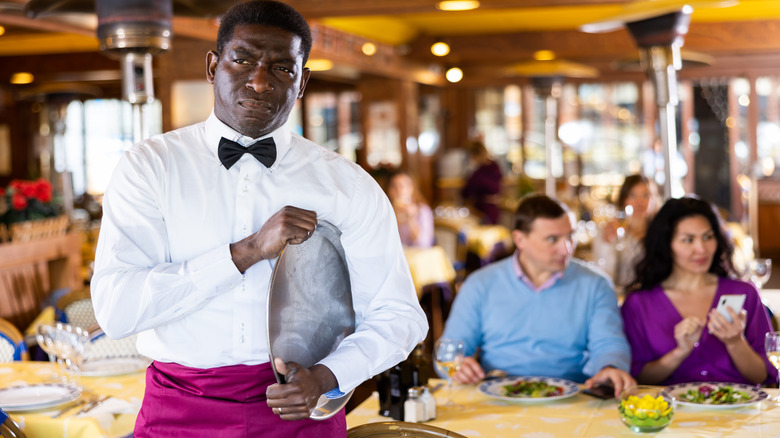14 Crucial Tips For Your First Restaurant Job, From A Former Manager
We may receive a commission on purchases made from links.
Now that the restaurant job pool has returned to pre-pandemic levels, folks are, once again, looking to the industry for work, whether they have experience in the kitchen or not. TV and online media have provided a glimpse into the once-secret world of restaurants, making jobs in the industry a bit more glamorous and desirable than they were before the reign of "The Bear." If you're attracted to high-intensity, face-paced work that combines creativity with skill and resourcefulness, the restaurant industry is an excellent place to look for your next job.
For over 12 years, I've held various positions in restaurants including server, cook, busser, barista, and manager, so it's fair to say that I've lived and breathed restaurant life. As such, my years of restaurant experience offer a comprehensive understanding of the various jobs and responsibilities that are available in restaurants, whether your goal is to cook at a Michelin Star restaurant or sling coffee in a fast-casual spot. I geared this list to act as a general guide for restaurant jobs in various positions, including those in back-of-house (the kitchen) and front-of-house (the dining room).
Don't be late
When starting a new job, it's important to give a good first impression to your new boss and co-workers, and being on time is the easiest way to establish that you're a fastidious worker and you take your job seriously. But, while this tip can easily apply to any job, it's particularly significant when it comes to restaurants.
Showing up late on a busy day is the perfect recipe for a stressful shift. Arriving on time, or even a couple minutes early, gives you time to set up your station, make sure everything is organized, and mentally prepare for the incoming busy day. Walking in late to a rush of customers flooding the kitchen with orders is so stressful that I still have frequent nightmares about it, and it's as easy to avoid as making sure you show up on time.
Being on time, especially when you're the new kid on the block, is also a great way to establish rapport with your coworkers. It shows that you value and respect them and, therefore, don't want to leave them shorthanded.
Know the menu
While training, your supervisor will undoubtedly instill in you that knowing the menu is a must, and they're absolutely correct. Imagine waiting on a table when a customer asks you an innocuous question about an item on the menu, and you aren't able to respond. This results in you having to leave the table to go ask your boss or coworker, causing a lengthy disruption (not to mention some slight awkwardness). Your table might find your inexperience unprofessional, even if you let them know that you're new. The same goes for those in the kitchen; having to take the time to look over the ingredients in a dish before you start preparing it holds you up and disrupts the flow of your shift.
To avoid this, make an attempt to study the menu before your first shift. Writing down every item on the menu and its ingredients will help you commit it to memory. Then, you can keep your handwritten menu in your pocket and study it during downtime at work. But don't stress if you don't have it completely memorized on your first day (unless that's expected of you, which is typically the case in fine dining). Eventually, you'll know it like the back of your hand.
Take notes and ask questions
Just like how handwriting the menu will help you commit it to memory, jotting down tips and tricks that you learn while training will also prevent you from forgetting them. While training, and during your first couple of shifts, it's a great idea to keep a notebook in your pocket and write down anything that you think you're likely to forget. This could be the restaurant's shorthand to use when writing orders, the ingredients in the signature sauce, or even the names of regulars so you can greet them with a personal touch. Taking notes also demonstrates to your supervisor that you're serious about the job and are excited to learn the ropes.
A notebook is also a great place to keep answers to specific questions you might have. Chances are, they'll be a few things that you're confused about, and that's perfectly understandable. Don't shy away from asking your boss or coworkers about anything you don't fully understand, and then jot down their responses so you can easily remember them.
Know what to bring
More likely than not, you won't be expected to bring anything specific to get started on the job, because the restaurant will provide everything you need. But, in some circumstances, you'll either be expected to bring certain tools or you'll want to bring along one or two items to make the job a little easier.
In the kitchen, chefs and line cooks are sometimes expected to bring their own knives — especially in upscale restaurants — or may want to do so because what the restaurant provides might not cut it (pun intended). Having your own knives — or at least a single chef's knife, like this one from Victorinox — to work with is typically preferred, that way you're responsible for keeping them sharp and you can choose your favorite brand and preferred size, giving you a more comfortable, enjoyable work experience. The same goes for servers, who are sometimes expected to bring along an apron to keep all the items they'll need throughout the day. For both front and back-of-house, it might be a good idea to bring along things like pens and markers, towels, or lighters, that way you know you'll always have access to them.
Stay organized
This general tip applies to every job, but it's especially crucial in the fast-paced, often stressful environment of restaurants. On the line, you'll probably encounter the phrase mise en place, as in "how's you mise en place?" or "work on your mise en place." This French kitchen term means "everything in its place." Good mise en place refers to keeping a well-stocked, clean prep station and making sure you have everything that you'll need for the day at your disposal. It's usually the first thing you'll check when you start your shift, because bad mise en place equals a hectic day ahead.
Although mise en place is a term that's typically reserved for the kitchen, the same applies to front-of-house workers. Keeping your apron and station organized and ensuring you have everything you'll need for the day (pens, a notepad, a calculator, and so on) before you start your shift helps your work day go by smoothly and guarantees that you won't be scrambling around to find something in the middle of a rush.
Wear the correct uniform
Some restaurants will supply clothes for you to wear during your shift, such as chef pants or chef's whites for the kitchen crew or a collared, button-down shirt and slacks for the front-of-house staff. But, if your restaurant doesn't supply a uniform, make sure you check with your supervisor what you're expected to wear at your particular restaurant, and if it's up to you what you wear to work, make sure it will keep you comfortable while being functional and complying with health codes. If you're able to choose what color to wear, stick with black; this way, if you spill food or liquids on your clothes during your shift, it won't be as noticeable.
To comply with health codes and prevent the spread of illness, restaurant workers are generally expected to refrain from wearing excessive jewelry, keep long hair tied back, and only wear clean clothes to work. For those in the kitchen, it's a good idea to wear long pants and sleeves to prevent burns.
The most important aspect of your uniform comes down to footwear. During a double shift, you might be expected to stay on your feet for the better part of a dozen hours, and flimsy footwear can cause long-term back problems or result in dangerous slips and falls. Close-toed, non-slip footwear is an absolute must — like these non-slip clogs from Crocs — for those in the kitchen and those in the dining room.
Understand your state or city's health codes
Chances are, going over your local health code guidelines will be a part of your training, but if not, make a point to familiarize yourself with these important rules. Restaurants are frequented by either scheduled or impromptu visits from health inspectors, so staying abreast of these codes can prevent an innocent mistake from causing the restaurant to be reprimanded or even fined. You can typically find health code guidelines for restaurants on your state or city's Department of Health website.
Some general tips for keeping a restaurant that's up-to-code include practicing FIFO, which stands for first in, first out. This refers to rotating through food to ensure that the older ingredients are always used before the freshest ingredients. Avoid eating on the line or in other areas where food is prepared and stay home from work when you're sick, especially with gastrointestinal or respiratory illness.
Stay alert
Things move fast in the restaurant, and I mean fast. Quick movements coupled with dangerous tools and hot foods can be a recipe for disaster, so make sure to stay alert and aware at all times in this busy environment. In the kitchen, you'll likely have to move out of the way of your coworkers carrying hot items from the oven or crossing the kitchen with knives and other sharp tools and, more often than not, they're in a rush. Not paying attention and walking into a hot tray of food or bumping into a cook using a slicer can cause a major injury.
In the dining room, servers will be rushing around with armloads of plates headed for tables, so staying sharp and aware of your surroundings is an absolute must to avoid causing an epic mess. This is especially true when walking around blind corners; be sure to make your presence known so servers with a limited view don't bump into you.
Learn the lingo
There are a lot of words and phrases used exclusively in the kitchen, and knowing what they are before you start your new job will make you feel like a pro before you've even picked up a chef's knife or taken your first order. Make a point to learn some of the commonly-used expressions and unique words for specific kitchen tools before you start. While you're training, ask your new coworkers what the most common kitchen phrases are; they'll likely be more than happy to share the insider knowledge with you.
Some of the basics include "behind," which you'd say when walking behind someone who may not be aware of your presence, especially when you're carrying something precariously. You can also say this when coming around a blind corner, or add "hot" if you're carrying a hot dish or tray behind a coworker. "86" is a common kitchen term meaning that something has run out, as in "86 the soup special" or "86 green onions." Cooks and chefs typically respond with "heard" when a coworker or superior tells them something to indicate that they've gotten the message, since the kitchen tends to be loud. "All day" refers to a total number of a food item that needs to be "fired," or prepared, as in "five steaks all day," meaning that there are five total hamburgers that need to be made across all tickets.
Mentally prepare for stressful shifts
Restaurant jobs across all positions have the ability to be extremely fun and rewarding, but they rarely come without exhausting, arduous days. Learn healthy stress management tricks for those days that are particularly difficult to employ during your shift or at home, before or after your work day. Meditation, breathing techniques, maintaining a positive attitude, and being fully mindful and present during your shift eases tension and results in a smoother day than you would have if you were consumed by anger, nervousness, and stress.
Before you start your new restaurant job, learn to identify which shifts will be busiest so that you can mentally prepare. For example, I always made sure to get a particularly good night's sleep and have a little extra coffee in the morning before holidays like Valentine's Day or Mother's Day, because these days are guaranteed to be busier than you thought was physically possible. Weekends also tend to be much busier than weekdays, so come into work mentally prepared for an intense, potentially challenging day. But, ultimately, these days are worth it when you can finally take a breath and relax, have a drink with your coworkers, and cheers to a job well done.
Don't take anything personally
This rise in popularity of movies and TV shows that take place in the kitchen and books like Kitchen Confidential have uncovered the arcane ferocity of restaurant work. Now, it's no secret that the stress of the kitchen can manifest in those who keep the ship afloat, most notably as anger and hostility. No high-intensity job comes without a bit of anger, and it's perfectly natural for people to get upset, so try not to take something personally if your superior or coworker gets angry with you when you make a mistake. Chances are, the hectic day is causing them to release their tension in not-so-healthy ways, but it's perfectly acceptable to expect an apology when a coworker or superior lashes out at you.
For servers, bussers, and hosts, dealing with customers can have the same result. You will, without a doubt, occasionally experience a rude or unruly customer. Attempt to handle the situation as calmly and professionally as you can, and don't shy away from getting a superior involved if you find that the ordeal is out of your hands.
That being said, if you feel like you're being treated blatantly unfairly to the point where it's affecting your overall attitude about the job or making you uncomfortable to come to work, always inform a superior or talk it out with your coworkers. There's a fine line between an occasional angry outburst and outright harassment, so don't be afraid to make note of the difference when you experience the latter.
Accept that you'll make mistakes
Working in a new position in an entirely new industry is always going to result in a few mistakes made in the beginning. Instead of beating yourself up when you make a mistake, accept that this is inevitable when starting a new job. Even seasoned professionals slip up, sometimes resulting in a peeved customer or an irritated boss, but there's no such thing as perfection, especially in the cutthroat world of restaurants. So when you make a mistake, acknowledge it (your coworkers and superiors will respect your integrity) and make a point to learn from your mistake so you don't repeat it.
Make sure to stay patient with yourself in the beginning, because there's a lot to remember when working in a restaurant, and you won't have everything down pat in a day. When I started new restaurant jobs, it would usually take me at least a month to know all the ins and outs of that particular restaurant, even with a few years of experience under my belt.
Consider your experience as a customer
Even if you're new to working in a restaurant, you're probably not inexperienced when it comes to eating in one. In order to deliver the best possible experience to your customers, consider what kind of experience you like to have as a restaurant customer. Reversing the roles and applying this mindset helps you become skilled at your job in no time and even transforms you into a more mindful diner.
If you're working as an expeditor, think about how you — as a customer — expect dishes to be plated and presented. Dishwashers should consider the level of cleanliness and organization they'd want in a restaurant they're dining at. As a line cook, reflect on the level of care and attention to detail that you want to go into your own food. Servers can consider how often they like to be checked on when they're going out to eat, and how it always adds a nice touch to your meal when your water glass is always full.
Keep an open mind
Any new situation calls for an open mind, and this certainly applies to restaurant jobs, where customer service and creativity are both vital aspects of the industry. If your new position is in the kitchen, you'll likely be asked to cook differently than you do at home, so you might need to learn a few tricks from your boss and coworkers. Instead of attempting to stick to your tried and true techniques, focus on adopting the restaurant's methods, even if you think your way is better. Consistency is important in any restaurant, and if — in the future — you have an opportunity to inquire about changing things up, you can absolutely do so; but that's typically an option for more longstanding employees.
In the dining room, you may be expected to interact with customers in ways that you're not used to, whether it be more professionally or using certain phrases or greetings that the restaurant expects you to use. Even if these customer service methods seem clunky and strange at first, stick with it to maintain the flow of the restaurant, and eventually it will become second nature to you.

